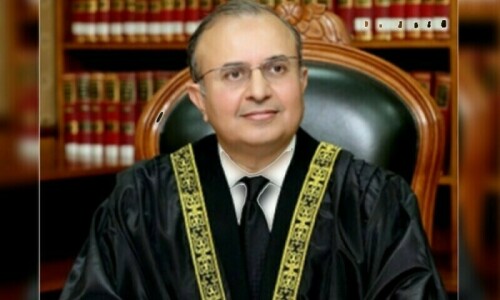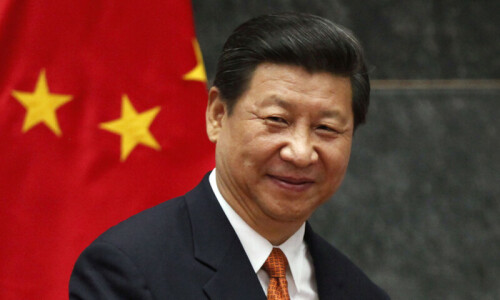ISLAMABAD: The Supreme Court on Thursday ordered the federal government to recover about Rs400 billion Gas Infrastructure Development Cess (GIDC) dues from consumers in 24 instalments but blocked further collection thereafter.
The court ruled that application of the GIDC between 2011 and 2015 had accumulated a total amount of Rs700bn, specifically for three pipeline and infrastructure projects, out of which about Rs295bn had been collected and Rs405bn would be recovered now.
Since the cost of these projects was less than Rs700bn, the objective of the cess had legally been achieved and its collection should come to an end at once, the court ruled.
In a majority judgement of two-to-one, the three-judge bench headed by Justice Mushir Alam also cautioned the government that the levying of cess under the GIDC would be considered practically dead if work on the laying of three gas pipeline projects was not commenced immediately.
The projects to be launched include the North-South pipelines within six months, TAPI pipelines as soon its laying in Afghanistan reaches the stage where the work of laying pipeline on Pakistan soil can conveniently start and the Iran-Pakistan pipeline as soon as the sanctions on Iran are no more an impediment in its laying.
Orders that no further collection of cess from consumers will be made
Authored by Justice Faisal Arab, the judgement said in case no work was carried out on North-South pipeline within the prescribed time and for laying any of the two other major pipelines though the political conditions became conducive, the purpose of levying cess would be deemed to have been frustrated and the GIDC Act, 2015 would become permanently in-operational and considered dead for all intents and purposes.
The court however restrained the government from charging the cess under a power which would remain suspended until the cess-revenue collected and that which was accrued so far but not yet collected was spent on the projects listed in Section 4 of the GIDC Act, 2015 (the three projects).
In the remaining period of the financial year 2020-21 while considering fixation of sale price of CNG, Ogra and the government would not take into consideration the element of the cess under GIDC Act, 2015 as one of the cost of sale of GNG.
The judgement held that the entire purpose of enacting GIDC Act, 2015 was to facilitate import of a very important source of energy i.e. natural gas / LNG from nearby countries to meet the ever expanding energy needs of the country since indigenous energy resources were fast depleting and the cheapest way to import was through overland transnational pipelines.
Around Rs295bn had already been collected towards cess-revenue and together with the outstanding amount the total sum by the end of this month would be in the vicinity of Rs700bn, which was more than the estimated cost of the three projects, the court observed.
The objective which the parliament had promised in the GIDC Act, 2015 was clearly ‘purpose based’ which was distinctly defined and carried with it an element of quid pro quo, making it a fee-imposing enactment instead of a pure revenue raising measure like taxes in general were imposed with no precondition attached for their spending, the judgement said.
It said since all industrial and commercial entities which consumed gas for their business activities passed on the burden to their customers / clients therefore all arrears of the cess that had become due up to July 31, 2020 and had not been recovered so far would be recovered by the companies responsible under the GIDC Act 2015 from their consumers.
But as a concession, the same be recovered in 24 equal monthly instalments starting from Aug 1, 2020 without the component of late payment surcharge. The late payment surcharge would only become payable for the delays that might occur in the payment of any of the 24 instalments, the judgement said.
Dissenting note
Justice Syed Mansoor Ali Shah in his dissenting note asked the government to return and refund the GIDC to the payers in full and constitute a committee to work out a mechanism for refund of GIDC, be it the gas consumers under the act or the final consumers (people of Pakistan).
Even if the gas consumers had passed on the fee to its customers, technology might be available to credit such customers, so that there was no unjust enrichment on the part of the state, the dissenting note said, adding that the amount of the GIDC that could not be refunded after exploring all other avenues, would remain earmarked and be utilised only for the infrastructure development of the gas sector.
The judgement noted that a sum of Rs295bn was collected as the GIDC during the last almost 10 years. Keeping these facts in mind, and especially the issue of energy security, in the larger national interest, Justice Shah observed, the federal government should be given six months to initiate appropriate legislation in the light of the principles settled in this judgement, including a clear description of the services being rendered, provision of a reasonable timeline for the delivery of service (supply of natural gas) to the consumers and a statutory mechanism of obligations and consequences that might arise, if the service was delayed or was not delivered at all. In case the federal government fails to do so during this period, it will refund the amount of the GIDC.
Published in Dawn, August 14th, 2020
















































